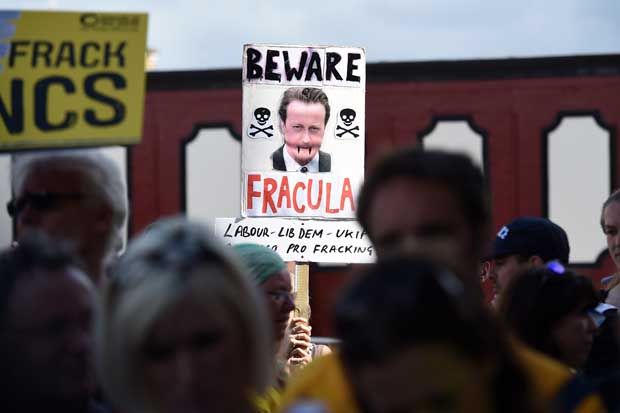That democracy is a superior form of government to any other goes without saying. But in order to function, it has to be conducted in such a way and on such a scale as to ensure that the people or their elected representatives are making decisions based on genuine alternatives. With this week’s decision by Lancashire County Council to reject a second application for fracking on a site near Blackpool, something has gone seriously wrong. An important national issue has been allowed to be settled according to purely local concerns.
Warned by their lawyers that there were no environmental or safety grounds for rejecting the application, councillors instead voted to throw it out on the grounds that it would have an ‘adverse urbanising effect on the landscape’ — this, about a temporary drilling rig. While it might be understandable that locals should be concerned about development on their doorstep, they would have made a very different decision, of course, had the consequence of rejecting a fracking rig been to deprive themselves of an energy supply. Nationally, those are the alternatives on offer. The result of blocking the construction of energy infrastructure is a rapidly worsening energy crisis.
An energy policy which favours a switch to cleaner energy is a good thing, but not to the point where it threatens supplies. While planned closures of dirty coal power stations are well on schedule, the introduction of cleaner energy sources is falling well behind. During 2013, generating capacity in Britain fell by 4.9 per cent. Demand for electricity, on the other hand, fell by just 0.2 per cent. Year by year, we are creeping towards the point when power stations will be un-able to keep pace with peak demand, leading to blackouts along the lines of those experienced during Edward Heath’s three-day week.
It is absurd that we have ended up in this position, when environmental concerns and the demands for cheaper energy could both be served by a switch to gas. Those who oppose fracking on the grounds that gas is a fossil fuel overlook the fact that the gas would be replacing a form of energy which is far dirtier. The United States has massively reduced its carbon emissions, thanks not to a Kyoto-style reduction treaty but its embrace of fracking. Anyone serious about cutting UK emissions (rather than about throwing -subsidy to green energy) should back fracking wholeheartedly.
A direct switch from coal to renewable energy — as many protestors demand — is simply not an option. It is now painfully obvious that wind turbines are no use; they produced just 1 per cent of electricity on the coldest day of this year, because the weather was so calm. Wind farms make their owners rich, and taxpayers poorer. It is encouraging to see Amber Rudd, the new Energy Secretary, acting quickly to stop more money being wasted on them. Already, with 15 per cent of electricity generated by renewables, consumers are paying £50 million a year to the owners of wind farms to switch them off when energy generation exceeds demand.
We now have the experience of other countries to draw on, too. Denmark claims to generate 48 per cent of its power from renewable sources, but only gets by thanks to importing 17 per cent of its electricity from coal–powered German plants.
Lancashire’s rejection of fracking is not necessarily final. Cuadrilla, the applicant, can appeal, in which case the matter may end up being decided by communities secretary Greg Clark. As he knows, if Britain manages to extract only 10 per cent of the shale gas which is mainly in Lancashire and -Yorkshire, it will be enough to produce 25 years of gas supply. Fracking has brought jobs and prosperity to American rustbelt states, and lowered gas prices to less than half that of Europe. Not since the discovery of North Sea oil has the country been offered such an incredible opportunity.
To match it, we need a planning system that recognises from the outset that infrastructure projects of national importance can only sensibly be decided by national government. It is one thing for local planning authorities to be given powers to lay down what style of housing may be built in their areas, and whether a chip shop should be allowed to open on the high street, but give local councils the ability to block power stations, roads and airports, and nothing is ever going to be built.
The government has rightly given its blessing to fracking, but it is about time that its rhetoric was matched by coherent practical support. This was difficult in the era of coalition, thanks to the Liberal Democrats. Now they have a majority, the Conservatives have the chance to proceed apace. They did not expect to be in this position, and cannot be expected to publish a bold Conservative energy plan immediately. But there really ought to be one by the time Parliament returns in the autumn. There is not much time to waste.






Comments